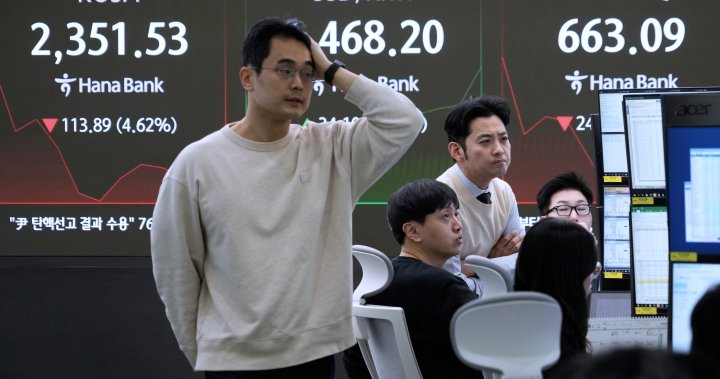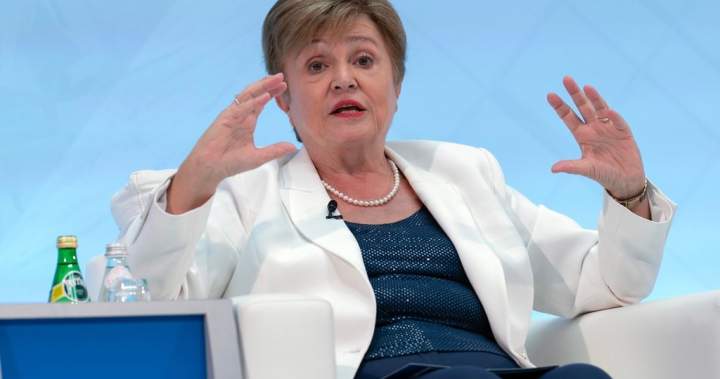Politics
Markets plummet amid warning of ‘economic nuclear winter’ from tariffs – National TenX News

Global stock markets extended a severe plunge Monday, fuelled by fears that U.S. tariffs would lead to a global economic slowdown.
European and Asian shares saw dramatic losses, the leading U.S. index flirted with bear market territory in pre-market trading, and oil prices sagged.
The Dow Jones Industrial Average dropped 1,200 points as trading began on Monday morning, and the S&P 500 was on track to enter a bear market, which means falling 20 per cent from a recent high.
Even some of Trump’s allies are raising alarms about the economic damage, and financial forecasts suggest more pain on the horizon for U.S. businesses, consumers and investors.
Billionaire Trump supporter Bill Ackman warned on Sunday about an “economic nuclear winter,” while calling for a 90-day pause on tariffs.
“The President has an opportunity on Monday to call a time out and have the time to execute on fixing an unfair tariff system,” Ackman said in a post on X, formerly known as Twitter.
“Alternatively, we are heading for a self-induced, economic nuclear winter, and we should start hunkering down. May cooler heads prevail.”
The massive sell-off in riskier assets at the start of the trading week follows President Donald Trump’s announcement of sharply higher U.S. import taxes and retaliation from China that saw markets fall sharply Thursday and Friday.
Tokyo’s Nikkei 225 index lost nearly eight per cent shortly after the market opened and futures trading for the benchmark was briefly suspended. It closed down 7.8 per cent at 31,136.58.
European shares followed Asian markets lower, led by Germany’s DAX index, which briefly fell more than 10 per cent at the open on the Frankfurt exchange, but recovered some ground to move down 5.8 per cent in morning trading.
In Paris, the CAC 40 shed 5.8 per cent, while Britain’s FTSE 100 lost 4.9 per cent in the European morning.
U.S. futures signaled further weakness ahead.
For the S&P 500, they lost 3.4 per cent, while for the Dow Jones Industrial Average, they shed 3.1 per cent. Futures for the Nasdaq lost 5.3 per cent. If the pre-market futures losses materialize when the U.S. market opens, the S&P 500 will enter bear market territory — defined as a fall of more than 20 per cent from the peak. The index was off 17.4 per cent as of the end of last week.
On Friday, the worst market crisis since the COVID-19 pandemic shifted into a higher gear as the S&P 500 plummeted six per cent and the Dow plunged 5.5 per cent.

Get breaking National news
For news impacting Canada and around the world, sign up for breaking news alerts delivered directly to you when they happen.
The Nasdaq composite dropped 3.8 per cent.
“There’s no sign yet that markets are finding a bottom and beginning to stabilize,” wrote Deutsche Bank analysts in a research note.

Trump suggests turmoil is ‘medicine’
Late Sunday, Trump reiterated his resolve on his decision to introduce tariffs of 10 per cent to 50 per cent on goods imported into the U.S., a move seen as massively disrupting world trade and supply chains across borders.
Speaking to reporters aboard Air Force One, he said he didn’t want global markets to fall, but also that he wasn’t concerned about the massive sell-offs, adding, “sometimes you have to take medicine to fix something.”
Heavy selling kicked in after China on Friday matched Trump’s tariff, upping the stakes in a trade war that many fear could end in a global recession.
Even a better-than-expected report on the U.S. job market, usually the economic highlight of each month, wasn’t enough to stop the slide.
“The idea that there’s so much uncertainty going forward about how these tariffs are going to play out, that’s what’s really driving this plummet in the stock prices,” said Rintaro Nishimura, an associate at the Asia Group.
Chinese markets often don’t follow global trends, but they also tumbled.
Hong Kong’s Hang Seng dropped 13.2 per cent to 19,828.30, while the Shanghai Composite index lost 7.3 per cent to 3,096.58. In Taiwan, the Taiex plummeted 9.7 per cent.
South Korea’s Kospi lost 5.6 per cent to 2,328.20, while Australia’s S&P/ASX 200 lost 4.2 per cent to 7,343.30, recovering from a loss of more than six per cent.
Asian economies are heavily exposed to Trump’s tariffs since they are dependent on exports, and a large share go to the United States.
“Beyond the market meltdown, the bigger concern is the impact and potential crises for small and trade-dependent economies, so it’s crucial to see whether Trump will reach deals with most countries soon, at least partially,” said Gary Ng of Nataxis.

Oil prices also sank further, with U.S. benchmark crude down $2.30 to $59.69 per barrel. Brent crude, the international standard, gave up $2.33 to $63.25 a barrel.
As with the larger sell-off, the drop was fueled by fears that the tariffs would slow economic growth.
That would hit demand for fuel, and the drop comes after moves to increase production by the OPEC+ producers’ alliance.
Exchange rates also gyrated. The U.S. dollar fell to 146.24 Japanese yen from 146.94 yen. The yen is often viewed as a safe haven in times of turmoil. The euro rose 0.3 per cent to $1.0992.
Nathan Thooft, chief investment officer and senior portfolio manager at Manulife Investment Management, said more countries are likely to respond to the U.S. with retaliatory tariffs.
Given the large number of countries involved, “it will take a considerable amount of time in our view to work through the various negotiations that are likely to happen.”
“Ultimately, our take is market uncertainly and volatility are likely to persist for some time,” he said.
The Federal Reserve could cushion the blow of tariffs on the U.S. economy by cutting interest rates.
That can encourage companies and households to borrow and spend.
But Fed Chair Jerome Powell said Friday that the higher tariffs could drive up expectations for inflation and lower rates could fuel still more price increases.
Much will depend on how long Trump’s tariffs stick and how other countries react. Some investors are holding onto hope he will lower the tariffs after negotiating “wins” from other countries.
Stuart Kaiser, head of U.S. equity strategy at Citi, wrote in a note to clients that earnings estimates and stock values still don’t reflect the full potential impact of the trade war.
“There is ample space to the downside despite the large pullback,” he said.
Kurtenbach reported from Bangkok. Associated Press writers Ayaka McGill, Paul Harloff and Jiang Junzhe contributed.
with files from Associated Press reporters Chris Megerian and Josh Boak
Politics
Trump gifted Nobel Peace Prize by Venezuela’s María Corina Machado – National TenX News

Venezuelan opposition leader María Corina Machado said she presented her Nobel Peace Prize medal to President Donald Trump at the White House on Thursday even as he has questioned her credibility to take over her country after the U.S. ousted then-President Nicolás Maduro.
The Nobel Institute has said Machado could not give her prize to Trump, an honour that he has coveted. Even if the gesture proves to be purely symbolic, it was extraordinary given that Trump has effectively sidelined Machado, who has long been the face of resistance in Venezuela. He has signalled his willingness to work with acting President Delcy Rodríguez, who had been Maduro’s second in command.
“I presented the president of the United States the medal, the Nobel Peace Prize,” Machado told reporters after leaving the White House and heading to Capitol Hill. She said she had done so “as a recognition for his unique commitment with our freedom.”
Trump confirmed later on social media that Machado had left the medal for him to keep, and he said it was an honour to meet her.
“She is a wonderful woman who has been through so much. María presented me with her Nobel Peace Prize for the work I have done,” Trump said in his post. “Such a wonderful gesture of mutual respect. Thank you María!”
The White House later posted a photo of Machado standing next to Trump in the Oval Office as he holds the medal in a large frame. A text in the frame reads, “Presented as a personal symbol of gratitude on behalf of the Venezuelan people in recognition of President Trump’s principled and decisive action to secure a free Venezuela.”
Trump has raised doubts about his stated commitment to backing democratic rule in Venezuela, giving no timetable on when elections might be held. Machado indicated that he had provided few specifics on that front during their discussion.

Get breaking National news
For news impacting Canada and around the world, sign up for breaking news alerts delivered directly to you when they happen.
She did not provide more information on what was said.
‘We can count on President Trump’
After the closed-door meeting, Machado greeted dozens of cheering supporters waiting for her near the White House gates, stopping to hug many.
“We can count on President Trump,” she told them without elaborating, prompting some to briefly chant, “Thank you, Trump.”
Before her visit to Washington, Machado had not been seen in public since she travelled last month to Norway, where her daughter received the peace prize on her behalf. She had spent 11 months in hiding in Venezuela before she appeared in Norway after the ceremony.
The jubilant scene after her meeting with Trump stood in contrast to political realities in Venezuela. Rodríguez remains in charge of day-to-day government operations, along with others in Maduro’s inner circle. In her first state of the union speech Thursday, the interim president promoted the resumption of diplomatic ties between the historic adversaries and advocated for opening the state-run oil industry to more foreign investment after Trump pledged to seize control of Venezuelan crude sales.

Trump has said it would be difficult for Machado to lead because she “doesn’t have the support within or the respect within the country.” Her party is widely believed to have won 2024 elections rejected by Maduro.
White House press secretary Karoline Leavitt called Machado “a remarkable and brave voice” but also said the meeting didn’t mean Trump’s opinion of her changed, calling it “a realistic assessment.”
Leavitt told reporters that Trump supported new Venezuelan elections “when the time is right” but did not say when he thought that might be.
A ‘frank and positive discussion’ about Venezuela
Leavitt said Machado had sought the face-to-face meeting without setting expectations for what would occur. She spent about two and a half hours at the White House.
“I don’t think he needs to hear anything from Ms. Machado,” the press secretary said while the meeting was still going on, other than to have a ”frank and positive discussion about what’s taking place in Venezuela.”
After leaving the White House, Machado went on to a closed-door meeting with a bipartisan group of senators.
Sen. Chris Murphy, D-Conn., said Machado told them that “if there’s not some progress, real progress towards a transition in power, and/or elections in the next several months, we should all be worried.”
“She reminded us that Delcy Rodríguez is, in many ways, worse than Maduro,” he added.
Asked if Machado had heard any commitment from the White House on holding elections in Venezuela, Murphy said, “No, I don’t think she got any commitment from them.”

Sen. Bernie Moreno, an Ohio Republican, was exultant following the meeting, saying Machado “delivered a message that loud and clear: What President Trump did was the most important, significant event in Latin America. That getting rid of Maduro was absolutely essential.”
Machado’s Washington stop coincided with U.S. forces in the Caribbean Sea seizing another sanctioned oil tanker that the Trump administration says had ties to Venezuela. It is part of a broader U.S. effort to take control of the South American country’s oil after U.S. forces captured Maduro and his wife less than two weeks ago at a heavily guarded compound in the Venezuelan capital of Caracas and brought them to New York to stand trial on drug trafficking charges.
Leavitt said Venezuela’s interim authorities have been fully cooperating with the Trump administration and noted that Rodríguez’s government said it planned to release more prisoners detained under Maduro. Among those released were five Americans this week.
Trump said Wednesday that he had a “great conversation” with Rodríguez, their first since Maduro was ousted.
Machado doesn’t get the nod from Trump
Just hours after Maduro’s capture, Trump said of Machado that “it would be very tough for her to be the leader.” Machado had steered a careful course to avoid offending Trump, notably after winning the peace prize, and had sought to cultivate relationships with him and key administration voices like Secretary of State Marco Rubio.
The industrial engineer and daughter of a steel magnate, Machado began challenging the ruling party in 2004, when the nongovernmental organization she co-founded, Súmate, promoted a referendum to recall then-President Hugo Chávez. The initiative failed, and Machado and other Súmate executives were charged with conspiracy.
A year later, she drew the anger of Chávez and his allies again for travelling to Washington to meet President George W. Bush, whom Chávez considered an adversary.
Almost two decades later, she marshalled millions of Venezuelans to reject Chávez’s successor, Maduro, for another term in the 2024 election. But ruling party-loyal electoral authorities declared him the winner despite ample credible evidence to the contrary. Ensuing anti-government protests ended in a brutal crackdown.
Politics
IMF chief backs Jerome Powell, U.S. Fed independence amid Trump pressure – National TenX News

International Monetary Fund chief Kristalina Georgieva on Thursday underscored the importance of keeping central banks independent and threw her support behind beleaguered Federal Reserve Chair Jerome Powell, who is facing a Trump administration investigation for renovation cost overruns.
Georgieva told Reuters in an interview that there was ample evidence that central bank independence worked in the interest of businesses and households, and that evidence-based, data-based decision-making is good for the economy.
The IMF managing director said she had worked with Powell and respected his professionalism.
“I have worked with Jay Powell. He is a very good professional, very decent man, and I think that his standing among his colleagues tells the story,” she said, when asked about a letter of support signed by her predecessor, Christine Lagarde, now head of the European Central Bank, and other large central banks.
Powell on Sunday disclosed that the Trump administration had opened an investigation into him over cost overruns for a $2.5 billion project to renovate two historical buildings at the Fed’s Washington headquarters complex.

Get daily National news
Get the day’s top news, political, economic, and current affairs headlines, delivered to your inbox once a day.
Powell denies wrongdoing and has called the unprecedented actions a pretext to put pressure on him for not bowing to U.S. President Donald Trump’s long-running demands for sharply lower interest rates.

The probe has sparked widespread criticism from some key members of Trump’s Republican Party in the U.S. Senate, which must confirm his nominee to succeed Powell, along with foreign economic officials, investors and former U.S. government officials from both political parties.
Trump has repeatedly derided Powell’s leadership of the Fed and attacked him, often personally, over what he sees as the Fed chair’s slow moves to cut interest rates. On Wednesday, he dismissed concerns that eroding central bank independence would undermine the value of the U.S. dollar and spark inflation, telling Reuters, “I don’t care.”
Georgieva said the IMF looked carefully at issues such as monetary and financial stability, as well as the strength of a country’s institutions. It was specifically interested in the Fed, given the role of the U.S. dollar as a reserve currency.
“It would be very good to see that there is a recognition … that the Fed is precious for the Americans. It is very important for the rest of the world,” she said.
Trump has also attempted to fire another Fed official, Governor Lisa Cook, who has challenged her termination in a legal case that will be argued before the Supreme Court next week.
Politics
B.C. Premier David Eby says province’s LNG, mining of interest to India TenX News

B.C. Premier David Eby spoke to reporters on Thursday morning from Mumbai, India, during his six-day trade mission.
He said that mining and energy companies in India are showing an interest in B.C.
“They are looking strongly to LNG as one of their ways of reducing carbon intensity, as well as reducing smog in the country,” Eby said.
“And so B.C. LNG has been an item of considerable interest, especially the projects that are reaching final investment decision over the next year — LNG Canada Phase 2, KSI Lisims LNG — as well as the projects that are under construction like Woodfibre LNG.”

Eby was also asked about the rise in extortion cases in B.C.
He said the province’s extortion task force will provide an update next week.

Get breaking National news
For news impacting Canada and around the world, sign up for breaking news alerts delivered directly to you when they happen.
“We have assembled a remarkable and historic task force, RCMP, CBSA,” Eby said.
“There are more police in Surrey right now than there have ever been. The RCMP has surged resources into the community.”
Eby said he has not been happy with the fact that there has been no update from the task force and he has asked them to provide one.
“There have been some important developments, people deported, an arrest here in India, cooperation between the Indian government and the Canadian government on this at the law enforcement level,” he added.
“That needs to continue, but, bluntly, we need better results, we need to see more arrests and whatever we can do to support the police to get the job done, we will do so.”
As of Jan. 12, Surrey police said there have been 16 reported extortion incidents in the city since the beginning of the year.
© 2026 Global News, a division of Corus Entertainment Inc.
-

 Fashion10 months ago
Fashion10 months agoThese ’90s fashion trends are making a comeback in 2017
-

 Entertainment10 months ago
Entertainment10 months agoThe final 6 ‘Game of Thrones’ episodes might feel like a full season
-

 TenX Exclusive10 months ago
TenX Exclusive10 months agoअमर योद्धा: राइफलमैन जसवंत सिंह रावत की वीरगाथा
-

 Politics8 months ago
Politics8 months agoBefore being named Pope Leo XIV, he was Cardinal Robert Prevost. Who is he? – National TenX News
-

 Politics9 months ago
Politics9 months agoPuerto Rico faces island-wide blackout, sparking anger from officials – National TenX News
-

 Fashion10 months ago
Fashion10 months agoAccording to Dior Couture, this taboo fashion accessory is back
-

 Tech10 months ago
Tech10 months agoIndian-AI-software-which-caught-30-thousand-criminals-and-busted-18-terrorist-modules-its-demand-is-increasing-in-foreign-countries-also – News18 हिंदी
-

 Politics9 months ago
Politics9 months agoScientists detect possible signs of life on another planet — but it’s not aliens – National TenX News














